|
|
|
Sort Order |
|
|
|
Items / Page
|
|
|
|
|
|
|
| Srl | Item |
| 1 |
ID:
110892
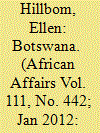

|
|
|
|
|
| Publication |
2012.
|
| Summary/Abstract |
Due to a combination of exceptional economic growth and social development, Botswana has been hailed as an African developmental state. This article rejects the developmental state theory and instead attempts to build an alternative theoretical model. It argues that from the 1930s until the present, Botswana has experienced a state structure characterized by natural resource dependency, lack of economic diversification, a dual society, selective social development and a close connection between the economic and political elite. In the tentative theoretical model presented and discussed here, these are all defining traits of a gate-keeping state. It is hence argued that while Botswana's socio-economic development since independence should in no way be underestimated, it is better understood as the efforts of a development-oriented gate-keeping state rather than a developmental state.
|
|
|
|
|
|
|
|
|
|
|
|
|
|
|
|
| 2 |
ID:
115828
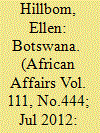

|
|
|
|
|
| Publication |
2012.
|
| Summary/Abstract |
I am delighted that my article 'Botswana: a development-oriented gate-keeping state' has instigated a debate with such a distinguished scholar as Ian Taylor. While post-independence Botswana is well known for economic growth, social development, and a maturing formal democracy, how we understand and interpret the drivers and substance of this success story has become increasingly controversial. I believe that instead of being content with Botswana's present achievements it is justifiable to ask: What is required for the country to erase poverty, develop its rural areas, achieve a diversified and sustainable economy and society, and become a high-income country characterized by modern economic growth, inclusive of social welfare and full political freedoms? It is in relation to such ambitions that it is imperative to understand the development potential of the existing state structure. I claim that with the present state structure there is significant risk that Botswana will stagnate rather than develop further, especially considering the possibility that the country will run out of profitable mineral deposits in the future and the militarization of politics that some argue is taking place under President Ian Khama.1 Given this, I argue that if the country is to continue and improve its development trajectory, structural change will be necessary. The facts of Botswana's post-1966 development have been presented in a rich body of literature and I do not believe that the controversy here is about the reliability of the facts. Instead, it is the interpretation of them and what inferences are to be drawn from them that is being discussed. This is far from a simple exercise in the sense that Botswana may not be a clear-cut case of any state model. Even Taylor himself writes that 'Botswana is an example of a state that has pursued certain policies … [which have led] … what might be …
|
|
|
|
|
|
|
|
|
|
|
|
|
|
|
|
| 3 |
ID:
084749
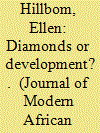

|
|
|
|
|
| Publication |
2008.
|
| Summary/Abstract |
Due to its four decades of high long-term economic growth and democratic system, Botswana has been depicted as an exceptional success story in a region full of economic and political failures. In this article, a structural analysis is applied, and it is argued that Botswana's success should be understood as one of pre-modern growth without development. It is claimed that although the country may be a growth miracle, it has not yet experienced 'modern economic growth', characterised by structural change in patterns of production as well as in social and political institutions. Such analysis also offers an explanation for the duality of Botswana's economy and society, since pre-modern growth, as opposed to development, allows for significant poverty rates and extremely unequal resource and income distribution to prevail in the midst of plenty.
|
|
|
|
|
|
|
|
|
|
|
|
|
|
|
|
| 4 |
ID:
120911
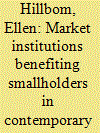

|
|
|
|
|
| Publication |
2013.
|
| Summary/Abstract |
Smallholders in developing countries can potentially benefit from access to local, regional, national and international markets as they intermediate between rural and urban demand for agricultural products and smallholder supply. This study investigates how smallholders in Meru, Tanzania make use of the various marketing channels that are available to them, and argues that the variety of potential marketing channels and easily accessible market information enables smallholders to weigh advantages and disadvantages with varying market opportunities and form rational decisions. It presents a case where producers, consumers and traders are the principal agents in building market institutions through what should be characterised as endogenous processes. As these market institutions correspond to smallholders' needs, they may be able to play an important role in the overall process of agricultural development in the area.
|
|
|
|
|
|
|
|
|
|
|
|
|
|
|
|
| 5 |
ID:
172577
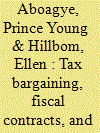

|
|
|
|
|
| Summary/Abstract |
Many Sub-Saharan African countries are unable to generate sufficient tax revenues for public purposes. While it is widely accepted that governments’ ability to tax is shaped by politics, the precise mechanisms through which this relationship takes place in practice remain elusive. Based on a historical analysis of four major tax reforms in Ghana from the 1850s to the late 1990s, this article captures the various ways in which taxpayers negotiate with the state in an attempt to limit the extent of taxation, especially in cases where state reciprocity falls short of what people expect. Our evidence suggests that, far from being a recent development, effective taxation in Ghana has long depended on the ability of the state to convince taxpayers that tax revenues will be used for the public benefit. A history of misappropriation of tax revenues, overt corruption, and profligacy diminished taxpayers’ support for governments’ tax efforts. More generally, the article points to the importance of understanding how tax bargaining works in practice and people’s perceptions of their governments over the long term to overcome resistance to tax reforms.
|
|
|
|
|
|
|
|
|
|
|
|
|
|
|
|
|
|
|
|
|